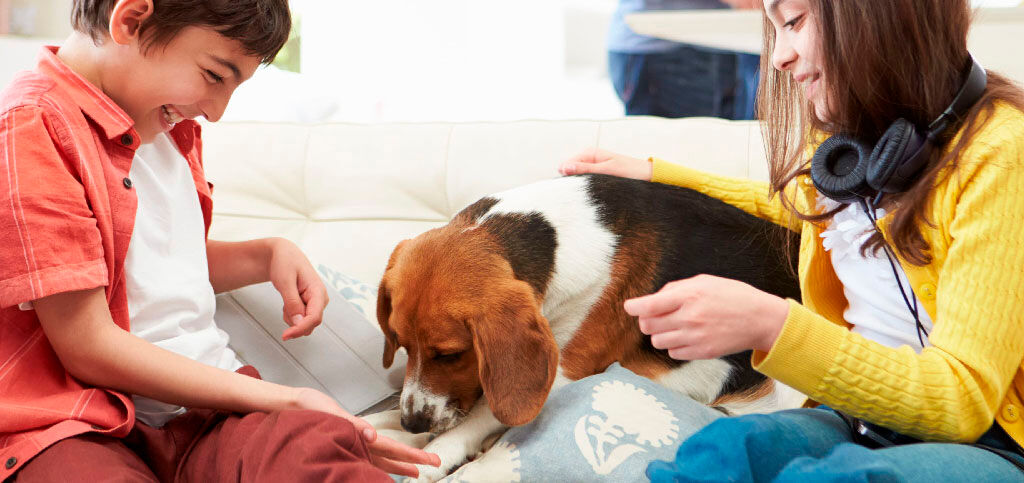The very word ‘dog’ immediately conjures up images of fun, games and lots of affection and cuddles... But first and foremost a dog is a living being. Making a puppy or an adult dog a part of your family means that you now have an ongoing and responsibility for him. This is a lasting commitment, and not one that should be taken lightly: a dog is for life. What are the things you need to think carefully about?
- It’s important to know which are the best dog breeds for flats. This information will help you to understand which breed of dog is best suited to your family's lifestyle, and to the size of your home.
- Furthermore, you need to take into account the block where you live (there may be rules that must be respected), as well as the neighbourhood you live in.
- It’s also vital to consider how much time you’ll be able to dedicate to your dog. All dogs need attention and physical and mental exercise, regardless of size or breed. It’s not a good idea for your family to consider getting a dog or a puppy if he’s going to be on his own for more than eight hours a day. Dogs are highly social animals, and they need to spend time with you and your family. If they’re left alone for too long, or hardly ever go out, they could develop behaviour problems - it’s important to be aware of this.
What to look out for: get it right when deciding which breed of dog will be best to share your flat
If you and your family are firmly committed to getting a dog, there are some basic guidelines that will help you choose your new friend - in this way you’ll make absolutely sure that you’re compatible. We’re going to take a look at these now, as well as the characteristics of certain breeds of dog.
Size and activity level: what are small breeds like?
Small dogs don’t take up too much space, and generally need less exercise than large ones. However, they’re often highly sensitive, and some breeds tend to bark a lot, such as Yorkshire Terriers. This can upset the the neighbours.
- The Bichon Maltese, Poodle, Cavalier King Charles spaniel, Chihuahua and Yorkshire terrier are examples of dog breeds that are suitable for small flats, or for people who have a sedentary lifestyle.
- On the other hand Cocker Spaniels, Beagles and Jack Russells are full of energy, and are perfect for people or families who are really active.
- A small or medium sized dog can adapt well to any space, and is an ideal companion for older people or those with reduced mobility.
Size and activity level: what are the characteristics of large breed dogs?
Big dogs generally need more exercise, above all if they’re young. This makes them more suitable for people and families who are really active. Size doesn’t mean that there aren’t some great breed who are happy to live in a flat, as long as their needs are covered.
- Greyhounds and Podencos are very adaptable. Can you guess where their favourite place at home is? The sofa!
- Golden Retrievers and Labradors are easy to train, and are very loyal to the family. They're great dogs because they adapt with ease to being in a flat. Did you know that these are breeds chosen as service dogs?
- A Border Collie could be a good choice if you like doing lots of exercise with your dog. They need lots of activity, both physical and mental, and are great if you like doing sports such as agility training or canicross. They’re really intelligent too.
- Giant breeds are are very good, and in some cases don’t need much exercise. But they can feel uncomfortable in small spaces, as a lack of space can make it difficult for them to move around.
Characteristics: What do you need to need to bear in mind?
- It’s best to choose a naturally calm dog, one that doesn’t bark at the slightest provocation. This way you’ll avoid upsetting your neighbours.
- There are dog breeds that are easy to socialise, which makes them excellent pets. Boston Terriers, French Bulldogs, Pugs, Pekingeses, and many mixed breed dogs are noted for their docile, easygoing natures. They’re great for city dwellers who live in blocks of flats, and will go down well with the neighbours.
- On the other hand there are others that are not suited to life in a flat. This is the case for example with guard dogs. These are usually great with the family, but very suspicious of people they don’t know. They’re also extremely territorial. Unless you already have experience of owning such dogs, they’re not a good choice if you live somewhere you inevitably meet your neighbours on the stairs or in the lift.
When you’re choosing a breed of dog to share your flat, it’s vital to understand the characteristics of those that you’re considering. By doing so you’ll know which breed is the best fit with the space and time you have available, and with your lifestyle.
If you’re still feeling unsure, consult a vet, an ethologist or even an animal shelter. Make a responsible choice!
 Copy link
Copy link
 Publish on Facebook
Publish on Facebook
 Publish on Twitter
Publish on Twitter
 Publish on WhatsApp
Publish on WhatsApp
